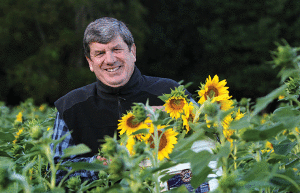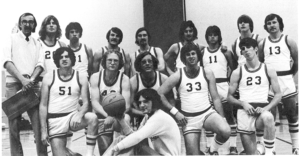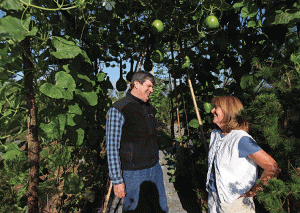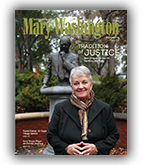
Farming didn’t stop Emmett Snead when a professor wooed him to join one of Mary Washington’s first men’s basketball teams. Photo by Norm Shafer.
Emmett C. Snead III ’76 became an agricultural success at a time when many other small farmers caved to debt and the pressures of giant agribusiness.
It would be easy to credit Snead’s first bachelor’s degree, a double major in economics and business, with giving him the foresight and flexibility to make his living from the land throughout the late 20th century and into the 21st.
But Snead also finds lasting value in his second bachelor’s, the one in geography from Mary Washington. The one he didn’t plan to get.
Born into a dairy farming family in Fredericksburg, young Emmett always knew he would be a farmer like his father. At 6, he helped out by washing udders. By 10, he was raising his own leghorn chickens and delivering eggs by bicycle.
He graduated from James Monroe High School; got a two-year degree from Louisburg College in North Carolina; and earned a bachelor’s degree from Emory & Henry College in 1973. He moved back home to his parents’ farm, where he helped his dad with twice-daily milkings, raised vegetables for sale, grew grain, and started a business spreading lime and fertilizer.
On sunny afternoons, he played pickup games at the city’s Kenmore Avenue basketball courts. That’s where he met Marshall Bowen, then an associate professor of geography at newly coed Mary Washington.
Bowen ran a men’s club basketball team of Mary Washington faculty, staff, and students. He thought the 6-foot-6-inch farmer would be a good addition to the informal team, if Snead would take a class or two and be a student.
Snead remembers he didn’t need much convincing.
Snead: “I’m good when there’s no rules or referees.”
Bowen: “Just come and have fun.”

The men’s basketball team as pictured in the 1976 Battlefield. Coach Marshall Bowen stands at far left near Emmett Snead (51). At right, Keith Littlefield stands between Glenn Markwith (11) and Gary Danley (13).
Club basketball was fun. But Mary Washington President Prince Woodard wanted to start a men’s varsity basketball program for formal competition, with Bowen as coach.
Bowen wanted Snead on the team, but he didn’t want any ugly fallout from playing a guy who’d already gotten a degree somewhere else. The coach recalls asking longtime administrator Ray Merchent what to do, and Merchent set rules based on NCAA regulations.
First, Snead had to have eligibility left. He did – he’d earlier played two semesters of college ball as a walk-on, but he was OK to play two more. Second, Snead had to take at least 12 credits per semester and maintain a 2.0 average.
Despite a farm schedule that got him up at 4 each morning, Snead made the commitment. But college and basketball couldn’t always come first.
Bowen, now distinguished professor emeritus of geography, recalled one practice when Snead received an urgent phone call at the Goolrick gym. He threw on a coat over his uniform and yelled, “Gotta go, Coach, the cows are out!”
Bowen, now distinguished professor emeritus of geography, recalled one practice when Snead received an urgent phone call at the Goolrick gym. He threw on a coat over his uniform and yelled, “Gotta go, Coach, the cows are out!”
That wasn’t the coach’s only problem. As a new team at a still mostly female college, the Mary Washington guys weren’t promising. The Free Lance-Star predicted they wouldn’t win a single game in their first year. As Bowen remembered it, “We had trouble finding opponents weak enough.”
The players, who greatly enjoyed socializing off the court, weren’t too concerned. “We said we might not win the games, but we’ll win at the parties,” Snead recalled.
But with Coach Bowen on the sidelines and screaming fans in the home stands, the team won five games, lost 11. Snead said most of the wins that first year were at home, and by just a few points. On the road, they generally got killed.
It was at one of those away losses, though, that Snead set a Mary Washington basketball record that’s never been broken.
It was a rare 60-degree day in February, and Bowen remembers that Snead spent all that nice morning plowing. By the time the team piled into a few station wagons to head to Washington Bible College in Maryland, Snead, the starting center, was wiped out.
Still, that Saturday, Feb. 22, 1975, his shots kept falling. Snead made 18 field goals, a record matched in 1986 by Brian “Buddy” Hawley ’87, but still unsurpassed.
The next year, the team got some bigger, better players, and Snead didn’t play as many minutes per game. But with a deeper bench, the Mary Washington men went a respectable 8-8.
And Snead enjoyed some memorable classes, especially geography with Bowen and Samuel T. Emory, and geology with King Stablein. Snead kept playing ball, and he formed lasting friendships with teammates including Allan Jenkins and Steve Jones ’75; Glenn Markwith and Gary Danley ’76; and Keith Littlefield ’79. They and other friends from those Mary Washington years regularly gather for summertime crab-pickings at Snead’s farm.
Snead has used a lifetime’s education, formal and informal, to make smart decisions about farming.

Emmett and Ellen Snead, shown here on their Caroline
County farm, are leaders in the Virginia “locavore” movement. Photo by Norm Shafer.
His family switched from dairy to beef cattle in 1997, and his father, Emmett C. Snead Jr., died in 2002. Snead; his mother, Jane Frazier Snead ’50; and his brother, George, grow grain and vegetables, keep cattle, and encourage agritourism at the family’s Braehead Farm, the last farm remaining within Fredericksburg city limits. (Snead’s Mary Washington connections also include his maternal grandmother, Mary Gibson Frazier, who took summer courses in the 1950s to recertify as a teacher, and his paternal grandmother, Mary Lula Smith Snead, Class of 1914).
Meanwhile, Snead started Snead’s Farm in Caroline County and built a business selling asparagus and other produce to restaurants and grocery stores. He supplemented that with pick-your-own crops and a prosperous roadside produce stand, still popular today. Wife Ellen, who retired six years ago as a spice company executive, has now taken a more active role in the farm, coordinating autumn visits for school groups to pick pumpkins, the most successful single crop.
That coincided with a surge of interest in community-supported agriculture (CSA), in which customers buy weekly shares of whatever locally grown produce is most plentiful. Snead was on it right away. “ ‘Locavore’ is what I was doing before the word was even coined,” he said.
Over the past seven years, the CSA has grown to the point that he no longer delivers to chain groceries. Customers come to him, picking up their fruit-and-vegetable variety bags each week. Sometimes they bring the kids to pet calves, chickens, and llamas, and fill their lungs with country air.
Snead’s long-ago geology classes helped him decide in recent years which parts of the farm to place in a conservation easement, in partnership with nearby Fort A.P. Hill and the Virginia Outdoors Foundation. He and Ellen put 293 acres in the easement and reserved 86 acres for other uses.
One possibility is to use the land as home sites for their three daughters – Jessica, 25, who’s completing a doctorate in pharmacy, and college-student twins Savannah and Emmalyn, 20. All three daughters still come home summers to help with the business.
Snead’s vicarious interest in the rest of the world, nurtured by those geography courses, will soon translate to European travel as he and Ellen visit relatives living in France. They’ll return before CSA season heats up; meanwhile employees will take care of the farm.
Though Snead didn’t think he particularly needed his Mary Washington degree, he said he’s benefited from a liberal arts education.
“You learn things from one part of your life,” he said, “that will help you in another part.”
